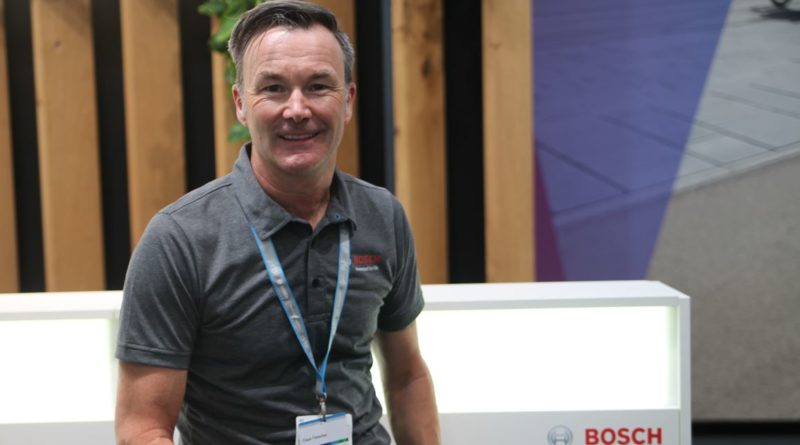Bosch eBike CEO talks shortages, the mathematics of city mobility and safeguarding e-Bikes
In the e-Bike world the CEO of Bosch eBike Systems is looked upon to have all the answers as to what comes next for a bustling marketplace. In an exclusive interview with CyclingIndustry.News Claus Fleischer explains that it may be the mathematics of the transport ecosystem alone that makes the e-Bike a nailed-on success…
Transport is at a crossroads. While we are making our way from Friedrichshafen to Munich it’s evident that Germany is further along the line than most European territories. It is until we meet a local who tells us that the cycle lanes in Munich need work that we are under the impression the transition to smaller mobility is moving freely. Eyebrows raised and jaws dropped we warn the local not to come to the UK if they think Germany has it bad.
In the EU, which obviously now does not include Britain, there is a political appetite seemingly both at the grass- roots level, but also from central authorities. Cycling’s role as a green transport form has been propelled onto the discussion board with some high-profile names within the European Commission pledging to fight the corner of the two-wheeler industries.
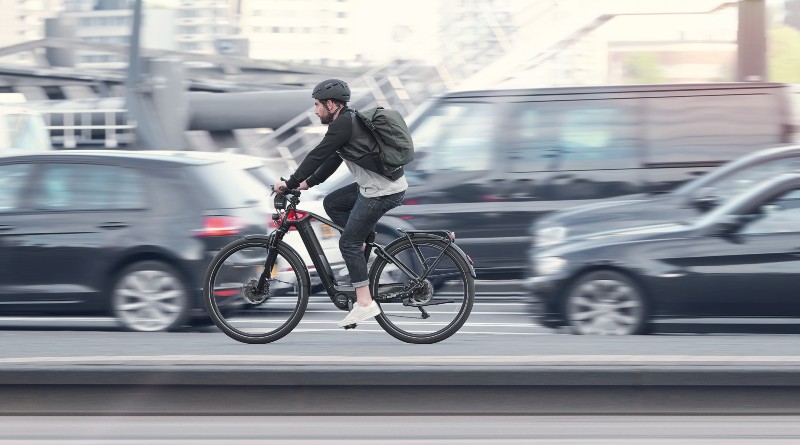 As we sit down with Bosch eBikeSystems’ CEO Claus Fleischer the politics of transport and how to bring about the pace of change desired is quickly the focal point.
As we sit down with Bosch eBikeSystems’ CEO Claus Fleischer the politics of transport and how to bring about the pace of change desired is quickly the focal point.
“I talked to the mayor of a German city last week and his desire was to have the ability to experiment. This, he says, is crucial to find out what works and what is not palatable. Normal planning procedures are so staggered and take too long. He wanted the freedom to trial ideas but is restricted in how ambitious a project he can lay down in his city. To devolve that power from central Government is the primary wish of local policymakers who wish to be the difference,” starts Fleischer.
In his position at the helm of a multi-national company in a booming segment of the bike world, Fleischer is often looked upon to have the answers on all things e-Bikes and as such carries some influence on the topic of mobility. He has recently encouraged a raft of high profile politicians to continue to be courageous in developing the work toward a goal of greater sustainable transport provision during the pandemic, but determines that “somewhere along the line they have lost their courage,” in reference to some city planners undoing constructive work to drive cycling.
It is, feels Fleischer, an inevitability of sorts that smaller mobility, including the e-Bike, will become a substantial force in the transport ecosystem. Looking around at the IAA Mobility show, the invitation to the bike industry to participate is evidence enough that somebody has done the mathematics of personal car ownership and population growth.
“Ten years ago Bosch looked at the challenge of mega urbanisation of society and industry. We saw this challenge, realising that one answer – public transport – was expensive and takes too long. So, the bicycle is a great alternative. The main reason Bosch eBike Systems exists is because of the transport mega trends. We want to provide for society a solution for up to five and ten-kilo- metre journeys that makes sense to everybody.
“Interestingly, in Bosch’s own history the Bosch business sector was named with automotive in mind, but we renamed to account for broader mobility trends and that was 12 to 14 years ago. Now the IAA international auto show has become a mobility show. This is now the broader roof of our world’s, it’s no longer just about cars. You will already see it in a city like Munich. The industry itself is not necessarily closer together but for consumer the choice in mobility is blurring at the fringes.”
To test the theory that the consumer is ready to move beyond reliance on the car Bosch has conducted its own experiments. Claus recounts one particular social experiment alongside a German University in which car keys of residents were traded in for ten days in exchange for an electric bike. Notes were taken before and after from the volunteers on what trips were undertaken and how.
Claus says of the results: “It was interesting to see that overall commuting and A to B transportation habits didn’t change, but the modal split began to change after the event. They were basically going the same distances, as often as before, but making the trips with an eBike. 73% of rides by e-Bike thereafter was the result, but the volunteers hadn’t had the idea previously to try the e-Bike for the trips. If you take a picture of congestion with minus 75% the number of cars the streets are empty. Our job now is to convert this precious street space to account for this possibility and drive the change. Of course, the auto- mobile is rather static as cars only move, on average, one hour per day. Immobile cars are using huge and valuable space, but convert that to suit pedestrians and cyclists and you’ll see fluidity in the city again.”
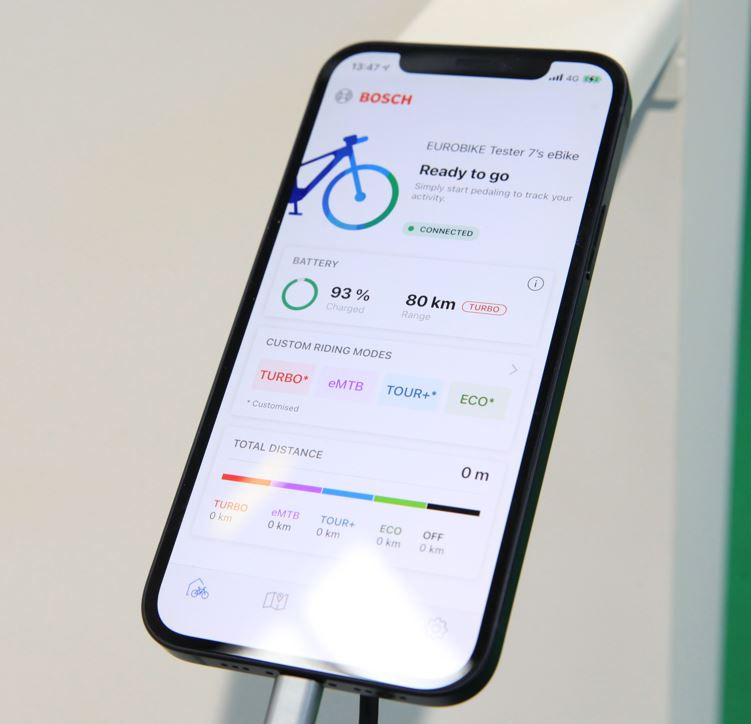
Next door to Bosch’s e-Bike booth is the group’s motoring arm and it’s plain to see the difference, not just for the brand, but across the IAA show in general. The two industries are worlds apart in budgets and influence, particularly in Germany. To adjust the priority will take some lobbying, but cycling has the advantage of ticking a lot of society’s requirements at present whereas motoring, it could be argued, is only entrenching a system that is not working for the urban world.
Fleischer says of this: “We have been operating without governmental willpower or subsidy. The results we have gained so far seems to be because people just like what we do. If we now convert the combustion engine to function on electric only, we will solve noise and real emissions, but we do not solve congestion. For the bike and e-Bikes I would rather prioritise the conversion of space for active travel before the subsidies come. There is an issue right now where the funding is growing to do just that, but now the city planners are saying we cannot spend it due to the length of the administration involved.”
Two-wheeled electric bikes aside, a focal point for the bike industry in recent years has been the cargo bike’s development. Bosch does not yet actively target the commercial side of this business, producing motors that are better suited to personal mobility rather than hauling the lofty loads required by postal providers, for example.
On this Fleischer says the opportunity remains two-fold, despite talk of a lofty share of electric cargo bikes now being built to satisfy commercial demand. “Cargo has two worlds: that’s private ownership for the car replacement, which is still the larger portion right now. Then you have the commercial cargo. Real commercial users such as postal services have very special regulations which cannot be fulfilled with a personal usage system. There are markedly higher requirements for durability and some want a throttle system.”
Naturally, at this point the discussion flows into what the appropriate regulations are for the various types of electric bike on the market; a topic that has been in sharp focus and covered on CI.N recently. Are the same regulations suitable for the large cargo haulers and what’s Bosch’s view on what should remain an e-Bike and which types require licensing, we ask?
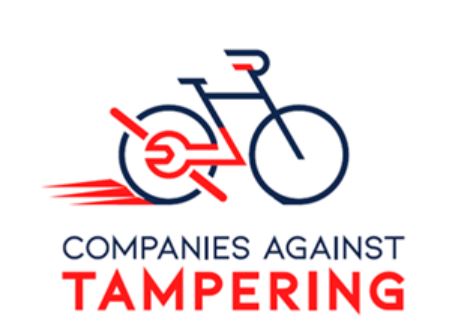
“Of primary importance to the industry at large is the safeguarding of the pedelec designed to cut of 25kmh; this must, at all costs, remain legislatively as a bicycle. That is our treasure. We know there are different influencers who have a view on changing this. In my view, they forget we may lose this status of the e-Bike within the bicycle framework. We must remain without licence and insurance requirement, with bike path access,” says Fleischer.
Bosch eBike Systems, with all its expertise on tailoring motor products, is therefore regularly called upon as a member of key trade organisations, such as CONEBI, to keep close contact with the political world in order to maintain a close dialogue. Without this link to the legislators, the risk of a market crash for e-Bikes becomes very real, argues Fleischer.
“Once we change something here that tests the boundaries we know that the European commission will be waiting with type approval and registration if the industry is seen to try the limits of standards. This will be the moment where all types become over regulated and at this point the consumer would cease to buy. Under type approval rules you cannot change even a brand of tyres and brakes easily; people forget this when changing regulations.”
Looking round at the IAA Mobility event, it is clear, however, that the cargo bike’s evolution in particular will stress test some of the existing regulations thanks not only to the evolution of the product, but the demands of those giving serious weight to their use as a replacement for an inner-city van. There are numerous iterations of the cargo bike on show here that, aside from legally being a bicycle thanks to the motor’s stops, are seriously testing the upper limits of what’s logistically possible.
“Commercial cargo is a challenge as naturally there is a tendency to ask for more power, speed and weight carriage; but it is the case that many wish to do all of this under the bicycle’s status. It’s a contradiction. We work intensively with CONEBI consulting on these issues. These larger vehicles should have their type-approval, but not in the same as e-Bike. It’s simply not a bicycle anymore,” says the CEO.
As Germany’s sales forecasts are surpassed, the electric bike is on the cusp of overtaking the bicycle in volume terms at 1.2 million pedal assisted units sold (+9.1% YoY) to 1.55 million traditional bicycles sold (-26% YoY).
This trend is reflected broadly across Europe, with Fleischer identifying the UK, Italy and France as “all coming up fast, alongside impressive numbers in larger Eastern European markets. As such, Bosch has increased its service offering to each territory in a bid to train up a new generation of electric-savvy mechanics.
“What we saw last year was a total market growing to around 20 million to 22 million units. Maybe this was a one-time Covid effect, but nonetheless the available volume sold through. In the long run every second bike sold in Europe will undoubtedly be ‘E’,” he believes.
Maintaining a tally north of 20 million has its immediate headwinds, of course and where others have dodged speaking openly on the supply chain’s crisis, Fleischer delivers a frank assessment, concluding “there is a shortage coming.”
The issue is more a supply of tech than mechanical components to Bosch, as it stands, says Fleischer: “So far we at Bosch have been able to produce and deliver all that was demanded for this and last year. We have battery cell and electronic components at the moment and so far we were able to procure to keep production running. Currently we have the first interruption landing with us, however. I cannot predict that in the next 12 to 18 months everything will be okay. Mainly it is electronic components, semiconductors and micro controllers that are the key barriers to staying on schedule. The reason is, quite simply, a huge demand from consumer products; smart phones have three cameras compared to one now, as an example of where component parts are going.”
There are of course further complications at the time of writing, most notably factories and ports remaining in a state of semi-regular lockdown in the Far East, not to mention the demand for containers creating a bottleneck on arrivals.
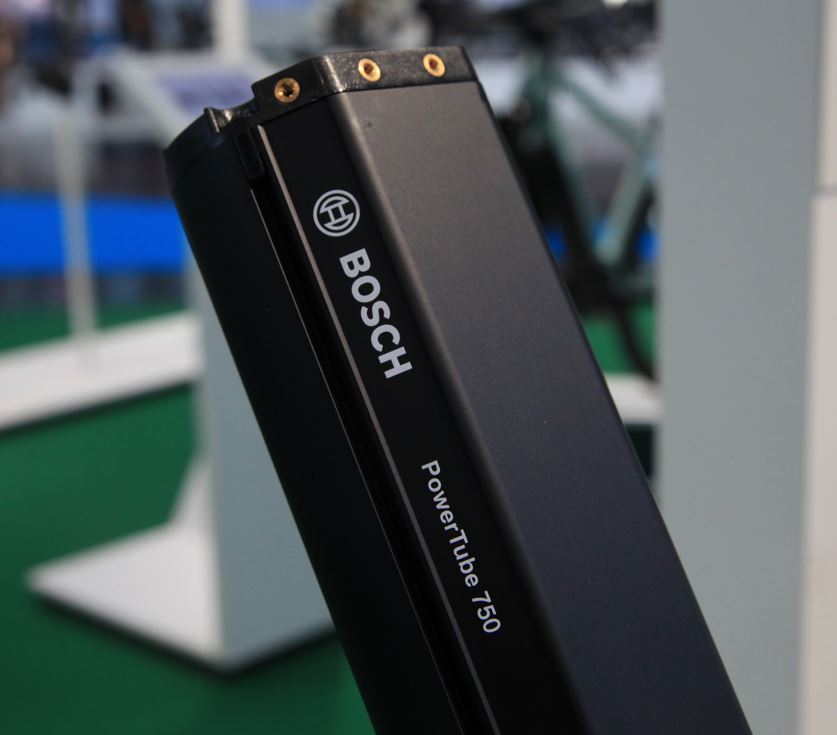
These are situations well beyond the control of a single industry, but there is one subject that during this time is under sharp scrutiny for which the bike world is able to make progress; that’s sustainability claims. The electric, of course, cannot fairly be argued to have the same credentials as a pedal cycle for eco-friendliness, but that hasn’t stopped Bosch taking action to limit the impact of certain raw materials early on.
“We don’t shout about this enough, but since our first battery for electric bikes was delivered ten years ago, we reduced the cobalt content down to 66%. This is huge achievement to reduce material use. It may also be little known that for every battery that comes to market we pay a fee into a funding pot to take the battery back through recycling process. There is a large reclaim effort for the aluminium, copper and cobalt.”
A final note on enhancing the product’s sustainability, Fleischer shrugs of the notion that hydrogen – used by a handful of electric cargo bike firms already to power vehicles – will become an alternative clean fuel source for vehicles this small in size. “I wouldn’t invest, the architecture required makes this more of a large vehicle proposition.
